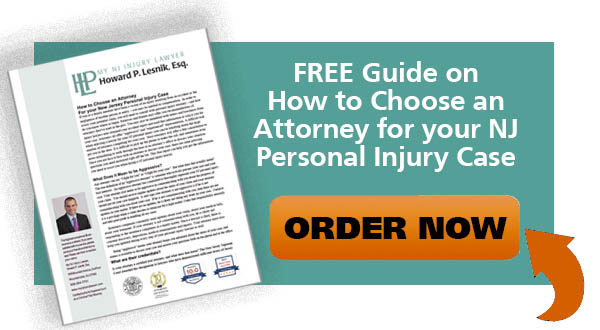For New Jersey residents, heading “down the shore” or taking to the water is a popular way to beat the-summer heat. Vacationers head to the beach or lakes even before Memorial Day and the fun continues well into the fall. The warm weather is an excellent opportunity to enjoy boating or the use of personal watercraft, but the popularity of boating brings its own dangers along. Car accidents remain the largest source of transportation-related injuries and fatalities in the U.S. However, recreational boating accidents easily take up second place, with more than 4,158 accidents that caused 2,559 injuries and 613 deaths, as reported by the U.S. Coast Guard for 2019.

Many of these accidents happen for the same reasons that car accidents happen: operator inattention, inexperience, or intoxication. People who rent boats and jet skis for the day can be inexperienced and cause serious accidents for their passengers or other boats on the water. These can be made worse by factors such as speeding and adverse weather conditions. Although boating under the influence has not been the target of concerted public awareness efforts in the way that drunk driving has, it is nevertheless illegal to operate a boat or “vessel” (here defined as having permanently or temporarily fitted propulsion machinery, or measuring at least 12 feet in length) while impaired by any drug or alcohol, with a 0.08 BAC threshold. Drunk boaters may face legal penalties including fines, jail time, and the suspension of both boating privileges and driver’s licenses.
Nobody expects that fun in the sun on water can turn deadly. Potential injuries that may be sustained in a boating accident can be devastating. The primary cause of fatalities in boating accidents is drowning, accounting for 76 percent of boating deaths, but aside from that notable difference, many injuries sustained in boating accidents are not dissimilar to those suffered in car crashes. When one car or boat strikes another, or collides with a stationary object, the occupants of the vehicle may be thrown about, struck by objects, or be injured by the force of the sudden deceleration. This can result in serious injuries, including damage to the neck, back, or spine; bone fractures; and traumatic brain injury (TBI).
If you are injured in a boating accident, you need to know what options you have to pay for your medical treatment. This is one critical way in which automotive and boating accidents in New Jersey differ: under New Jersey’s no-fault laws, the personal injury protection (PIP) coverage on each party’s own auto insurance policy covers that person’s medical treatment. However, no-fault laws do not exist for boating accidents, and boat insurance does not include PIP coverage. It does often include medical payments coverage, which works more like homeowners’ insurance than car insurance; this coverage takes effect after other insurance coverage options have been exhausted and there remains some amount of unpaid medical costs left over. Medical payments coverage extends to anyone who was injured on or by the insured boat, regardless of who was at fault for the accident. Since this coverage only applies after all other insurance options have been exhausted, your best option for covering your medical treatment (other than your own health insurance) is the liability coverage on the boat insurance policy of the person whose negligence caused the accident.
Another important reason to pursue a claim against the negligent boat operator’s liability coverage is that the costs of your medical treatment aren’t the only financial impact your injuries will have on your life. You may be unable to return to work for a period of time while you are recovering from your injuries – or in some severe cases, your injuries may have left you with a lasting impairment that prevents you from returning to the job you held previously. Likewise, your injuries may interfere with your everyday activities and responsibilities, including housekeeping and caring for children or pets. If you have to pay for help with these tasks, you deserve to be compensated for that expense, which would not have been necessary had you not been injured. In addition, the court system recognizes that injuries affect your enjoyment of life. These loses don’t have a price tag attached but are nevertheless significant and meaningful losses for which you deserve compensation. This can include the physical pain and psychological trauma resulting from a serious injury, as well as any important life events that you were unable to attend or enjoy because of your injuries. Lost wages, childcare expenses, and pain and suffering damages are not covered by your health insurance or medical payments coverage; the only way to obtain compensation for these forms of harm is by making a claim against the at-fault party’s liability coverage.
The most important thing you can do when setting out for a day on the water – is to wear a lifejacket, and of course, sunscreen. The most important thing you can do after a boating accident is to seek medical treatment right away, and follow all instructions issued by your medical providers. In doing so, you increase your chances of optimal medical recovery, and strengthen your injury claim.
Contact MyNJInjuryLawyer
If you or a loved one suffered an injury in a boating or jet ski accident in NJ, you should contact an attorney familiar with handling these claims. An experienced NJ Injury Lawyer will know how to obtain boating licensing, registration and insurance records, medical records, videos, photographs, experts, locate witnesses and contact the insurance company so you can make a claim for your injuries.
My NJ Injury Lawyer Howard P. Lesnik, Esq. offers complimentary strategy sessions to address any issue or questions you may have for your injury claim in NJ.
Please contact NJ Injury Lawyer Howard Lesnik, Esq., immediately if you were involved in an accident. I personally handle NJ personal injury cases on a regular basis. Please contact me now by email, by phoning 908.264.7701, or by completing the form to the right to schedule your complimentary 30-minute strategy session.


